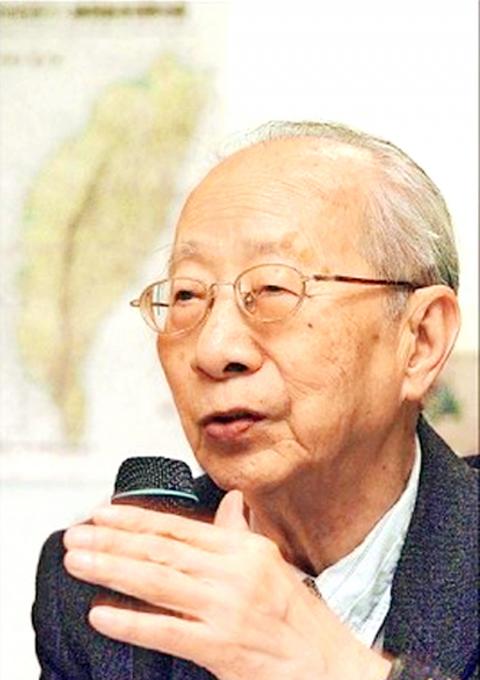Tsao Yung-ho (曹永和), an esteemed researcher who specialized in Taiwanese history at Academia Sinica, passed away on Friday in Taipei from multiple organ failure at the age of 94.
Tsao succeeded in his academic career by teaching himself. Born in 1920 to a wealthy family, Tsao read voraciously as a child, and absorbed large amounts of extra-curricular material with a particular interest in history, literature and philosophy.
After graduating from the Second Middle School of the Taipei State, the predecessor to the Taipei Municipal Chenggong High School, Tsao resisted social pressure to go to medical school and ended up not receiving a college education.

Photo: Liu Hsin-de, Taipei Times
Tsao chose to work in the National Taiwan University library and worked there for 38 years until he retired.
During his time at the library, Tsao worked with texts in a variety of languages and became fluent in Japanese, English and Dutch, and was also familiar with Spanish, German and Latin.
One of the few Taiwanese historians able to understand multiple foreign languages, Tsao made great contributions to research into early Taiwanese history. Some historians have said of Tsao that “If it were not for him, there would be no research into Taiwanese history.”
Tsao proposed in 1990 that Taiwan’s history should be approached via “a marine concept,” which was a departure from the “mainland concept” through which Taiwanese history had been viewed until then.
The approach sought to define the role of Taiwan in terms of marine transportation and trade beginning in the 17th century, when the Dutch first took over the island through the Dutch East India Company.
Tsao further expanded on the theory during the Martial Law era in 1950, bringing Taiwanese history to the attention of international historical researchers.
According to National Taiwan University history professor Chou Wan-yao (周婉窈), Tsao had a broad view of Taiwanese maritime history due to studying Dutch texts, adding that Tsao was a prominent figure in the field of Taiwanese history and had mentored key researchers such as Chung Shu-min (鍾淑敏), Chen Tsui-lien (陳翠蓮) and Lee Wen-liang (李文良).
Tsao became a member of the Academia Sinica, the nation’s top research institute, when he was 65 years old.
“Tsao was a gentleman who was courteous, kind and somewhat laconic,” Academia Sinica vice president Wang Fan-sen (王汎森) said
Although he had kept up with the times and attended the 2012 rally against media monopolization, Tsao never raised his arms or shouted slogans, but instead chose to quietly pay attention to the pulse of history and the culture of Taiwan, to embrace with a warm smile the island that he called home in a turbulent world, Academia Sinica member Wu Jui-jen (吳叡人) said.
Wu added that Tsao was quite enamored with The Blue Bird by Belgian author Maurice Maeterlinck, especially the line “happiness is where we are, in our homes.”

An essay competition jointly organized by a local writing society and a publisher affiliated with the Chinese Communist Party (CCP) might have contravened the Act Governing Relations Between the People of the Taiwan Area and the Mainland Area (臺灣地區與大陸地區人民關係條例), the Mainland Affairs Council (MAC) said on Thursday. “In this case, the partner organization is clearly an agency under the CCP’s Fujian Provincial Committee,” MAC Deputy Minister and spokesperson Liang Wen-chieh (梁文傑) said at a news briefing in Taipei. “It also involves bringing Taiwanese students to China with all-expenses-paid arrangements to attend award ceremonies and camps,” Liang said. Those two “characteristics” are typically sufficient

A magnitude 5.9 earthquake that struck about 33km off the coast of Hualien City was the "main shock" in a series of quakes in the area, with aftershocks expected over the next three days, the Central Weather Administration (CWA) said yesterday. Prior to the magnitude 5.9 quake shaking most of Taiwan at 6:53pm yesterday, six other earthquakes stronger than a magnitude of 4, starting with a magnitude 5.5 quake at 6:09pm, occurred in the area. CWA Seismological Center Director Wu Chien-fu (吳健富) confirmed that the quakes were all part of the same series and that the magnitude 5.5 temblor was

The brilliant blue waters, thick foliage and bucolic atmosphere on this seemingly idyllic archipelago deep in the Pacific Ocean belie the key role it now plays in a titanic geopolitical struggle. Palau is again on the front line as China, and the US and its allies prepare their forces in an intensifying contest for control over the Asia-Pacific region. The democratic nation of just 17,000 people hosts US-controlled airstrips and soon-to-be-completed radar installations that the US military describes as “critical” to monitoring vast swathes of water and airspace. It is also a key piece of the second island chain, a string of

The Central Weather Administration has issued a heat alert for southeastern Taiwan, warning of temperatures as high as 36°C today, while alerting some coastal areas of strong winds later in the day. Kaohsiung’s Neimen District (內門) and Pingtung County’s Neipu Township (內埔) are under an orange heat alert, which warns of temperatures as high as 36°C for three consecutive days, the CWA said, citing southwest winds. The heat would also extend to Tainan’s Nansi (楠西) and Yujing (玉井) districts, as well as Pingtung’s Gaoshu (高樹), Yanpu (鹽埔) and Majia (瑪家) townships, it said, forecasting highs of up to 36°C in those areas